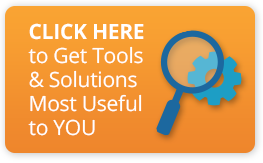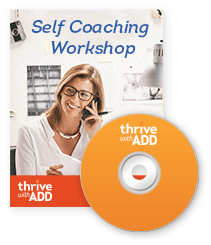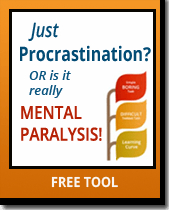 So why do we feel so alone?
So why do we feel so alone?
I've just finished delivering the pilot program of “Procrastination Transformation: Secrets to Getting Started.” The month-long course included an online interactive forum where class members were encouraged to comment, share, vent, express frustration, and — hopefully — post their triumphs as well.
However, for many, the greatest benefit of the virtual forum was the opportunity to feel that they were not alone. I gained insight into how rewarding people found it to open up and be frank with a group of other ADD / ADHD Adults. They weren't “weird” among a group of people who found it completely normal to put off doing a project until the very last minute, and then find themselves doing the dishes, surfing the web, and acting like they hadn't a care in the world — while inside, agonizing that they'll never get the project done on deadline. … all the while, doing anything EXCEPT the project!
I think it's this pervasive feeling of “aloneness” that makes shame such a strong ingredient in the ADD soup. It's hard not to feel you have a dirty secret when you are afraid to let anyone around you know about your struggles.
The ironic thing is, I believe in most work environments, the ADD / ADHD adult is NOT alone. You probably have colleagues, bosses , vendors and clients who share similar challenges behind the scenes, and are also being careful not to let anyone know.
Here's why I believe your ADD has plenty of company:
After I left my 20+ year corporate career and “went public” in 2001 about my own ADD and new career as an ADHD Coach, TWO of my former bosses told me they were ADD as well. Both of these individuals were quite high up, respected and successful in very large corporations of finance and management consulting.
I don't believe either of these individuals felt ashamed. They seemed to simply accept ADD as just another facet of themselves.
When my coaching clients tell me about their bosses and colleagues, quite often it seems they are describing someone with ADD. It's ironic to me that my client feels so ashamed of having a “weakness” when the person they report to seems to have habits that could indicate ADD as well: ignored emails, poor communication skills, impatience, lack of follow through, lateness in delivery. Yet my client usually feels shame and is afraid to ask for help for fear of being judged!
Perhaps how alone one feels has to do with the company you keep. When I mention the kinds of struggles ADD people deal with to my friends, probably 70% of them say they have experienced the same kinds of challenges for all of their life, and have often suspected they were ADD.
Since ADD adults often attract each other socially, I'm not surprised that so many of the people in my circle are ADD. These are all professional and creative individuals who just assume it's “normal” to experience procrastination, overwhelm and poor follow-through. While they're not happy about these challenges, and may be embarrassed by some of their procrastinating or disorganized habits, there doesn't seem to be the pervasive feeling of shame and aloneness about it.
So, the question that intrigues me is:





Robert Shuck
I would say that I’m ashamed of having ADD and that makes me feel alone.
Mary
Thus is a tough one. Chicken or egg almost. After I found out I had ADD, I learned about anxiety and found out it often happens in the same people for some undetermined reason. I’m fairly laid back and before reading about it didn’t think of myself as anxious. I don’t think others would describe me that way.
But the “official” description of anxiety, especially social anxiety, was a shock, like someone was looking over my shoulder all my life.
Plus my family definitely had stuff going on. Though I’m not positive it was ADD in my folks, my sister has it. At any rate, overall I’d say as a family we are socially challenged! Some to a greater degree.
My social skills didn’t develop. I felt overwhelmed in small groups. Therefore I avoided them and fell even farther behind. I’ve always felt I never fit in. And though it grates to say this, I’ve often felt like the scapegoat. That’s such a loser thing to say, but it keeps coming up in my life so I’m afraid there’s some truth to it.
I don’t know if it’s ADD and being different led to feeling like an outsider and therefore not experiencing a good many of the regular social interactions that rub off some of the odd-shaped edges. Or if it’s anxiety and its fallout. Or if it’s lack of role model/functioning social life in my family and its fallout. I suppose it makes sense that it’s all three situations together.
ADD I see as hardwiring. Anxiety is software. ADD is how you’re born, like being left-handed. Anxiety is probably inherited to a degree but it’s more like a problem with body chemistry that can be tinkered with. (Not to say ADD can’t be helped along, but I’m saying that I don’t consider ADD a disease or even a negative. It’s a neutral, simply another way someone is put together–like the left-handedness.)
The real question for me is how to get beyond outsider status, feel comfortable and make others comfortable around me. (While still honoring who I am, but I don’t think that’s much under attack.)
I’d love to hear your suggestions. Does this mean you’ve got a class in the works? What I’d really like is a magic bullet fix. Any of those handy?
Good post and good question. Painful everyday life experience.
Bonnie Mincu
Mary, what a thoughtful analysis! (I took the liberty of bold-facing the points that really stood out for me.) Personally, I agree with you that ADD can be a neutral, just the way someone is. Like any personality trait, it can have positive and negative qualities, and much of the problems associated with it can be managed if one learns how.
Anxiety is a different issue. There’s probably nothing positive about anxiety disorder, and many people with ADD also carry some anxiety. Because ADD makes us likely to hyper-focus, people who feel anxiety can get caught hyper-focusing on their anxious thoughts, ruminating on what they fear. Thus it can become a self-fulfilling prophecy. If you’re terribly anxious that people won’t accept you, you may hold back, act awkwardly, and then people you meet won’t get to really know you. The anxiety creates the social awkwardness, and contributes to always feeling like an outsider.
Shame functions much the same way. People with ADD who are ashamed go around ACTING ashamed, creating negative situations. If they stopped acting ashamed, their ADD wouldn’t be nearly as much of a problem. Ironically, they continue to blame the problem on their ADD, instead of the problem behavior or avoidance that the shame generates.
Helene F
yes, at times I do feel alone. even though i know plenty of other women who have ADD, i live with someone who does not, and he often makes me feel quite ashamed. actually, it’s me that makes me feel ashamed….he is quite neat and always seems to know where to put everything. also, he’s an avid reader, and i can’t finish a book….it’s a struggle and i’ve been dealing with this for over 18 years…
Bonnie Mincu
Helene, I’m glad you made the distinction between the person you live with MAKING you feel ashamed, versus you yourself feeling the shame. Of course, some people do have partners who are condescending and critical, or who say things that contribute to feelings of shame. But if you feel ashamed because your partner, friend or colleague simply is better than you are at certain things, it’s not the other person who is causing the problem; it’s your own self-talk.
Think of it this way. I know many people who are much better at math, science, technology, and languages than I am. People were created as unique individuals, so just because someone else has skills that I don’t, I don’t see why that should make me feel shame. I’d say the same about my ADD traits and poor memory. I don’t have the knack of automatically keeping things tidy and organized the way others do. (I always called myself “Pigpen” because I can clutter up a space simply by entering it!) But why should I feel ashamed at this weakness?
I WOULD feel embarrassed — ok, maybe ashamed — if I were to stay as a guest in a friend’s home and left a mess behind me after I left, because that would be rude and inconsiderate. But the shame would be targeted at my BEHAVIOR, at not remembering to clean up after myself — not at my whole self as a person. For inconsiderate behavior, I could apologize, take my friend to dinner, pay for her housekeeper, or make it up to her. Where many ADDers become dysfunctional with their shame is that, in an instance like this, they might avoid ever speaking to their friend again.
There’s so much to say on this topic. Maybe the next thing I need to create is a SHAME course.
Astrid
Helene,
I could really identify with your situation. My husband very much like yours. I believe the ADD had much to do with his leaving……I think for me a single life is in the cards.
Jim
As a business owner I feel extreemly alone, and many times embarrassed by my ADD traits. I feel like my proctastination and constent need to RE-organize overshadows my good/hard work and accomplishments in the eyes of my employees and undermines my ability to effectivly manage people. They don’t seem to take me seriously and dismiss my direction with “just another flavor of the day” or “don’t worry about it, he’ll forget about it anyhow…”. And there’s not really anyone I can speak to about my problems, solutions, or my ADD…
Alone, Frazzled, and Frustrated…
Bonnie Mincu
Jim, there’s a fascinating fact I learned in my training. The profile of a typical entrepreneur / business owner, and the profile of someone with ADD, are almost identical! In other words, it’s likely that a very high percentage of business owners like you ARE ADD! Probably the reason most new businesses fail is due to the more negative of ADD traits.
However, the negative habits, as well as effective management skills, are all skills that you can learn through coaching and training. Management / leadership training is quite common in corporations because most people don’t have those skills naturally; they have to learn them from someone. Before leaving corporate management to work independently, I managed the Training and Development department in a large corporation and developed lots of leadership training. I was responsible for training and coaching the management and team leaders in the company.
So Jim, and any business owner or leader who is struggling — I invite you to contact me directly to determine if coaching would be a good fit for you.
MALKAH GELLER
I’m not ashamed to say that I have ADD, but so many people -including those in psych fields- pooh pooh the term and thus, immediately dismiss my issue. So I can’t even get a second word in crosswise. And I don’t know how to intelligently argue with my (otherwise very good and loving) friend. My mind gets jumbled up immediately, especially if the other person is very eloquent and educated in the subject matter.
I feel alone because I have ADD and am not progressing in my business the way I would like to. Many times I admonish myself for not having enough discipline or willpower. After taking your excellent tele course on procrastination I feel heard and not so alone anymore, but I still don’t really know how to proceed to make lasting changes in the way I work… or at least I don’t know how to START… maybe that is my biggest issue. How to start, where to start… I too wish there was a magic bullet, like Mary says above.
Bonnie Mincu
Malkah, sorry, there is no magic bullet. (Believe me, if there were, I’d market it and get rich!) BUT, you can make changes that “magically” lead to new habits and create new success.
Regarding not knowing where to start in your business, write down the major and important projects — just a few, not a huge laundry list. For each, imagine yourself starting that project. If you can’t because another project needs to come before it, then do the same for that project. This visioning should get your thinking to a project that should come first. If it doesn’t, perhaps you can start with any one of your important projects and the order doesn’t matter.
Then, for the one you pick, break it down into smaller action steps one by one. Use the same kind of visioning to determine if something has to come first. For your action steps, list which must be done by someone else — for example, in areas where you don’t know how and don’t want to learn.
You should end up with a list of actions that need to be performed, indicating which must be delegated.
Mind-mapping can be really helpful for this kind of planning! Check out the download mind-mapping course, “Get Unstuck with Mind-Mapping.”
Barbara
There’s a lot here I identify with. I’m 57, so the average parent/teacher/friend hadn’t even heard of ADD when I was growing up. I always felt a little bit different from most of my childhood peers and somehow a little apart from them (I was the day-dreamy, non-hyperactive type), and it wasn’t until my nephew was diagnosed with ADHD decades later that I began to wonder. Now I’m having the same experience as Malkah — both family members and psych professionals pooh-pooh the idea of my having ADD. With family, it’s “Oh you’re too smart and talented,” when I mention it, but as soon as my symptoms create problems, then I’m “lazy, crazy or stupid” as one book title calls it. Even a couple of professional mental health workers I turned to wanted me to either “get over it” with behavior modification or treat it with sleeping pills and Prozac.
There are tasks I seem to have more than average trouble doing, and when I’m obliged to do them in public, or as part of a team, I’m ashamed of the mistakes I make, or the time it takes me to organize the process, or the exasperation expressed by family, friends and colleagues.
Standing up for myself and for the things I need in order to function is something I’m just beginning to master, and I’m having to face some eye-rolling and sneering from people I love, which is painful and makes me avoid them.
So I guess my answer to your question is that it’s a little of both: ADD can be isolating in itself, because it is “other,” but the isolation can be compounded by the shame resulting from criticism of the “otherness.”
Bonnie Mincu
After all these years coaching ADHD, I continue to be shocked that many professionals in the psychology field are still so ignorant about ADD. Yet I know that it’s true. The MAJORITY of professionals practicing psychiatry and psychology today still hold out-moded notions of what ADD is. They are likely unaware that about half of all people with ADD are NOT hyper-active, and that ADD has nothing whatsoever to do with talent and intelligence (unless it’s a positive correlation!). That’s because back when they got their training, very little was known about it, or what was taught back then was wrong.
As for the shame about tasks you have trouble doing, there are always things that people have differing degrees of ability for doing. I KNOW I’m going to be terrible at anything requiring coordination or athletic ability… and I don’t think ADD has anything to do with it! When I have to do something involving team sports (which I used to dread as a child!), I’ll be the first to tell people my athletic ability is nil. No shame about it, I just laugh at myself. You can be that way for anything you have trouble with. Why should you be good at everything?
If you have to do one of your challenging tasks in public, tell people, “When it comes to ___(fill in the blank), I’m just hopeless. Thank God, I have other talents, or I’d starve!” People are far less likely to judge you if you’re the first to laugh at yourself.
And if they insist on being unpleasantly judgmental, you’re hanging out with the wrong people!
m
“And if they insist on being unpleasantly judgmental, you’re hanging out with the wrong people! ”
I’m not sure it’s that simple. Sometimes these people are family and colleagues – even bosses – who can’t be avoided.
I’ve heard “then maybe you’re hanging out with the wrong people” plenty of times … but I have yet to hear any helpful suggestions for dealing with those “wrong people” when the circumstances of life are set up in a way that you can’t get away from them immediately and/or your resources are limited (as ADHD adults’ sometimes tend to be) for reaching out to new people or building an entire new life from scratch.
I’ve also noticed that the vast majority of ADHD-ers who are lauded as successful – you make reference to several of them in another post (Marc Cuban, Sir Richard Branson, JFK Jr., the usual suspects) tend to be *men*. Men expect, demand, and often receive a certain level of administrative support, with both their businesses and their lives, that women generally do not. Both men and women treat that as a man’s “due”. Women do not get the same treatment – and if they request it, the request is often treated as “bitchy” or “pushy” or “unreasonable”.
(This ^^ has happened to me personally in more than one environment … so I’m really not sure the answer is always “find a new bunch of people / find a new job” when one’s dealing with a cultural pattern, as opposed to just one in one single environment or city. Or state.)
Given that … what are us ADHD women supposed to do when the world refuses us the same level of administrative support? And/or demands that we’re supposed to be that support, doing some of the things at which we are sometimes the near-worst suited for, for others? Multiple others? Two bosses and a husband? And then the world shames you when you can’t manage those “basic wife/girlfriend” or “basic EA” responsibilities, even when you’re unafraid to delegate and request people to whom to delegate, and those requests are repeatedly denied? Or you can’t afford what the prospective delegatees are asking (do you know what professional organizers and Vas charge these days? If you need at least one of each, and you’re already underearning because of years of ADHD-related perceived failures … )?
I am … really kind of frustrated (and I’m sure it shows) that even “ADHD experts” tend to just … repeatedly ignore these kinds of questions, or shrug and say “Well, I don’t have any suggestions” when they’re posed. They aren’t rhetorical questions, and if you’ve been posing them for a number of years and still getting those dismissive responses, with no solutions, the results of “no help” in your life tend to build up and get cumulatively worse. Are people in those situations, even when they’re actively seeking help (I’ve seen plenty of professional counselors get up on YouTube – I was actually kind of shocked – and complain about their clients who skipped their appointments or weren’t communicative when they came in or were just … not proactive about seeking help. *This is not that.*) just supposed to be … written off?
Astrid
A great question that needs further analysis. I just thought I was “quirky”. But it wasn’t until my husband walked out after 27 years. I returned to school to find a way to support myself, realized just by observation and deducing that I probably had ADD. At 54 such things were not discussed as a child. I thought is was a result of my chaotic family life.
I carry great shame with this and feel as though a cancer diagnosis would have been easier to deal with. People are not kind about such “differences” and coupled with social anxiety …well lets just say life is far from a picnic…..
Susan
I am Barbara’s age cohort, I am 59. I have ADHD combined type. For many years I was in therapy at a clinic, I knew I had ADHD, yet the Psychiatrist refused to RX Ritalin. I would like to say NEVER LISTEN TO ANYONE TELL YOU, THAT YOU CAN NOT DO SOMETHING. I also have a learning disability, I needed an evaulation to get services and extended time in Graduate School. I went to the State Evaluation Center to have it done. I was really afraid, that if they found I did not have LD, I would just be stupid. It written that if there is a 10 point difference between verbal and performance, that is a clear indication of a learning disabiity. Instead this A-hole psychologist dx me w/ ridiculous things, and stated I could never complete Graduate school ,which I did at the age of 45!
The point I want to make, is according to the ADA we are allowed accomodations in Education, and on Exams. Unless we have a physical disability, we are not allowed accomodations in the workplace. We have ADHD, Anxiety, perhaps other disorders. We do not wear them on our sleeve per se, they are invisible. We maybe a little slower in our work, and who is going to disclose to an employer that one has a disability?
My speciality as a Social Worker is a field (Aging/Elderly) that badly needs experienced people, but there is more discrimination. A bad economy, and being not only an older worker, but an older woman. I need to figure out how to create a website to market my almost non existent private practice. Part of it is procrastination, and part of it is just not knowing what to say.
I apologize for this very long comment. I am alone because of difficult interpersonal skills. I feel alone because I have ADHD. To me they go hand in glove, so to speak….and here I am procrastinating about eating dinner!
Lauren
I KNOW I’m not alone. Many of my friends have ADD, and my family is like a light-up board for ADD in all of its various manifestations. In fact, if I compared myself to others in my family in terms of ADD’s debilitating effects, I wouldn’t come out looking too bad. But none of that has any relevancy for me when it comes to shame. Shame–along with its evil twin sister, Overwhelm–are like a storm cloud that so engulf me, I don’t even think about whether there’s anyone else out there suffering through the storm, just how can I get out of it myself? The picture you included with the blog post perfectly depicts this myopic effect.
sistaH afroe
I am 29 no learning disabilities, but my learning experience is impacted by my ADHD symptoms 30% attention 10% hyper 50% EF skills. Because I am gifted people are confused by me. One minute I am a talented articulate orator the next I am using sounds and hand gestures, people think I’m drunk, or other and through my lack of completion they underestimate my talents. My symptoms increased after my life became sedentary due to secondary OA.
I fought to get a place at uni and then discovered they didn’t know what to do with me re: communcation and accommodations. I know how to make a difference now but with out the right triad I will never make it.
Adhd EF/NRG – mobility- staff with appropriate training.
No person is an island all my efforts, must be met with a complementary working relationship otherwise it won’t work. Other students can chase up lectures and not forget to do other things. I can’t just yet and putting 12 balls in my court is a set up. I am being asked to used the very skills I dont have and no ones teaching these.
Susan
When I describe ADHD to my sister, she states it sound exactly like what she is doing at the moment. However, she was/is what is termed “The Normally Achieving Child” However, we all sure that my Father has it, though he vehemently denies it. We wonder about our mother as well. Overwhelm is a state I can definitely identify with. I think sometimes the best way to get out a state of overwhelm, is just to stop what you are doing. Take a rest, and try and tackle it later, or the next day.
Bizarrely enough, listening to Bonnie’s teleconference, made me sit on the floor and tackle a whole pile of old article from Social Work School. I unstapled many articles to reuse for computer paper, and the ones that were to bent, were put in the paper recycle bin.
Is there something you can do to help with overwhelm? Listen to music, and “paritlailize it.” Meaning break up into small parts. Bonnie had something about a woman moving a dresser into another room, and how she had to do it in stages.
I hope this is helpful.
Bonnie Mincu
Susan, congratulations for tackling the article pile! I’ve also found that listening to online or phone classes can be great for multi-tasking… (as long as it’s not emailing, since that requires some thought and then you miss taking in what’s in the class.)
The blog post you’re referring to is the “Case Study in ADD Overwhelm: Ellen Moves Her Dresser.”
The main solutions for overwhelm are 1) breaking things down, and 2) writing/ typing the steps into a form you can use them, such as a task list. Then you can make decide what comes first, where to plug the steps into your calendar, etc. It helps to get a feeling for how long tasks will take, and to learn planning. So some of this is not a quick fix!